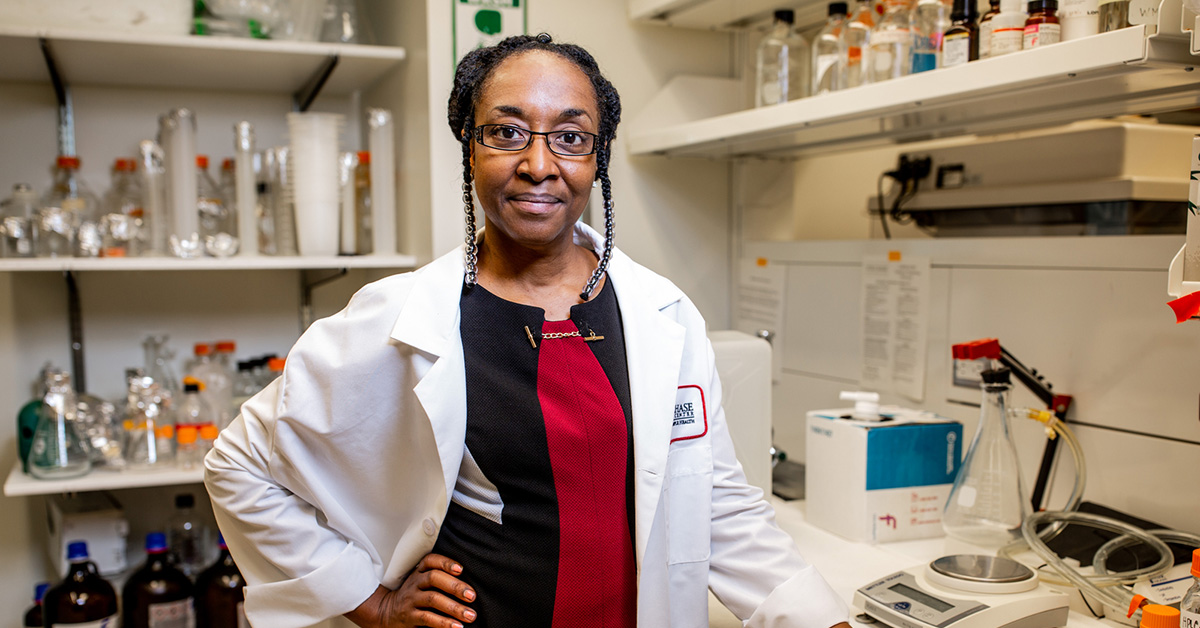
PHILADELPHIA (March 15, 2022)—Fox Chase Cancer Center has announced the appointment of Camille Ragin, PhD, MPH, as Associate Director of Diversity, Equity, and Inclusion (DEI).
“We recognize the importance of welcoming diverse voices, valuing different skillsets and backgrounds, and celebrating the collective richness of our individuality. This appointment formalizes leadership to move us forward in this area,” said Jon Chernoff, MD, PhD, Cancer Center Director at Fox Chase Cancer Center.
In this newly created role, Ragin will be responsible for enhancing hiring practices to encourage diversity, facilitating more diverse leadership at all levels of the institution, providing training and education on race-related issues to the community, and facilitating collaboration among the Lewis Katz School of Medicine at Temple University, Temple University Health System, and Fox Chase on issues of diversity and inclusion.
“DEI is a significant focus of the Fox Chase Cancer Center Support Grant, reflecting the serious commitment of Fox Chase and its collaborators to affect positive change that draws on the talent and experience of the center’s growing faculty and staff,” Chernoff said.
An accomplished and well-funded scientist, Ragin is a professor in the Cancer Prevention and Control Program who joined Fox Chase in 2011 from State University of New York – Downstate. Her research focuses on cancer disparities affecting populations of African descent.
Drawing inspiration from her family, Jamaican roots, and professional experiences, Ragin has dedicated her career to understanding why Blacks have the highest incidence and death rates as well as the shortest survival for most cancers in comparison to all other racial and ethnic groups.
In 2006, she founded the African-Caribbean Cancer Consortium (AC3), which today facilitates research collaborations among more than 150 members from 17 institutions in the United States and 23 countries in the Caribbean and Africa. Their work furthers the study of viral, genetic, environmental, and lifestyle factors for cancer risk and outcomes in people of African descent.
In addition, the Ragin laboratory established the Cancer Prevention Project of Philadelphia (CAP3)—a multicultural, community-based cancer prevention registry. Work by CAP3 has been instrumental in developing a successful model for population-based health disparities research studies, combining education and community engagement with successful research recruitment.
Earlier this year, Ragin and her collaborators were awarded a $1.65 million grant from the Chan Zuckerberg Foundation to decode Black genomes and to investigate the genetic drivers of breast, ovarian, and prostate cancers. As co-principal investigator, she is leading an international team of researchers from the United States, Africa, and the Caribbean called the African-Caribbean scNetwork.
They are studying genetic vulnerabilities in people from these regions to understand why Black people are at higher risk for aggressive cancers and often develop them at younger ages, and to expand diversity in molecular and cell studies.
In addition, she is part of a collaborative, multi-institutional team including researchers from Yale Cancer Center and the University of North Carolina Lineberger Comprehensive Cancer Center that is funded by a Specialized Program of Research Excellence (SPORE) grant from the National Cancer Institute to address obstacles in treating head and neck cancers.
Specifically, Ragin is studying differences in risk and disease course for Black versus white head and neck cancer patients to understand how African genetic ancestry might contribute to disparities in patient outcomes. This work also addresses disparities related to representation in clinical trials and how this affects what we know about treating cancer in different patient populations.
A member of the American Association for Cancer Research (AACR) since 2002, Ragin serves on some of its key membership groups, including Women in Cancer Research and Minorities in Cancer Research, to recognize scientific achievement, foster career development, and promote advancement in cancer research among these investigators, as well as to address disparities in cancer incidence and mortality faced by minorities and the medically underserved.
She is also a member of the AACR Minorities in Cancer Research (MICR) Council, which was formed 22 years ago as an advisory body to AACR leadership on issues of concern to minority investigators. She also co-chairs the AACR-MICR Minority Scholar in Cancer Research Awards committee, a program designed to increase the scientific knowledge base of minority scientists and to encourage them to pursue careers in cancer research by providing awards.
Ragin earned her doctoral degree in infectious diseases and microbiology and a Master’s of Public Health in epidemiology, both from the University of Pittsburgh. She has earned many notable awards, including an International Community Service Award, several citations from the City Council of Philadelphia, and the American Cancer Society’s Cancer Control Award for her unique contributions to cancer education and training.
In addition, she collaborates with several organizations that connect underserved populations of African descent to critical healthcare and educational services, including the Mayor’s Commission on African and Caribbean Immigrant Affairs, the Caribbean Community of Philadelphia, the African Family Health Organization, the Coalition of African and Caribbean Communities, the city of Philadelphia, and many others.